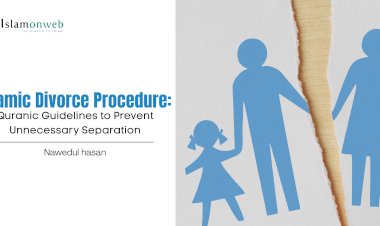The Rights and Responsibilities of Spouses in Islam
Marriage in Islam is a sacred institution that forms the cornerstone of a stable and harmonious society. It signifies mutual rights and responsibilities, creating a reciprocal relationship designed to foster mutual respect, love, and understanding. The guidelines provided by the Quran, Hadith, and Islamic jurisprudence ensure that both spouses fulfill their roles in a manner pleasing to Allah. This article explores these rights and responsibilities, drawing upon primary Islamic sources and scholarly works to provide a comprehensive understanding.
Rights and Responsibilities of Spouses
- Financial Maintenance (Nafaqah)
The husband is responsible for providing financial support to his wife, ensuring her basic needs such as food, clothing, and shelter are met. This obligation is underscored in the Quran:
"Men are the protectors and maintainers of women, because Allah has given the one more (strength) than the other, and because they support them from their means" (Quran 4:34).
Classical jurists, like Imam Malik in "Al-Muwatta" detail the husband's duty to provide for his wife's financial needs, including food, clothing, shelter, medical expenses, and other necessities to maintain her well-being [1].
Contemporary scholars such as As-Sayyid Sabiq in "Fiqh-us-Sunnah" reaffirm these duties, emphasizing the husband's role in maintaining the financial stability of the household, regardless of the wife's financial status [2].
- Kind and Respectful Treatment
The husband must treat his wife with kindness and respect, as prescribed in the Quran:
"And live with them in kindness. For if you dislike them – perhaps you dislike a thing and Allah makes therein much good" (Quran 4:19).
The Prophet Muhammad (peace be upon him) also emphasized this in his Farewell Sermon:
"Fear Allah concerning women! Verily you have taken them on the security of Allah, and intercourse with them has been made lawful unto you by words of Allah. You too have rights over your wives, and they have rights over you" [3].
Imam Malik discusses the ethical treatment of wives in "Al-Muwatta", stressing the importance of respect and kindness. Malik elaborates that this kind of treatment involves both physical and emotional support, recognizing the wife’s rights to be treated with gentleness and care, thus fostering a loving relationship [4].
Dr. Wahbah Al-Zuhayli in "Al-Fiqh Al-Islami wa Adillatuhu" underscores that mutual respect and understanding form the bedrock of a successful marriage, encouraging husbands to always act with compassion and empathy towards their wives [5].
- Mahr (Dower)
The mahr is a mandatory gift from the husband to the wife at the time of marriage. It symbolizes respect and commitment. The Quran instructs:
"And give the women [upon marriage] their [bridal] gifts graciously. But if they give up willingly to you anything of it, then take it in satisfaction and ease" (Quran 4:4).
As-Sayyid Sabiq, in "Fiqh-us-Sunnah," explains the mahr's role in ensuring the wife's financial security and symbolizing the husband's commitment. He emphasizes that the mahr serves as a form of financial assurance for the wife, ensuring that her rights and dignity are upheld [6].
- Obedience in Marital Matters
Islam encourages a wife to cooperate with her husband in matters related to the marital home, provided his requests align with Islamic principles. This cooperation fosters a balanced and harmonious household. The Quran states:
"Therefore, the righteous women are devoutly obedient, and guard in [the husband's] absence what Allah would have them guard" (Quran 4:34).
Imam Malik in "Al-Muwatta" outlines that obedience does not imply subservience but a cooperative partnership where both parties respect and fulfill their Islamic duties towards each other. The wife's obedience is within the bounds of what is reasonable and just, ensuring her rights are not compromised [7].
- Protection of Honor and Property
A wife is expected to protect her husband’s honor and property in his absence, safeguarding his reputation and managing household resources wisely. The Quran says:
"So righteous women are devoutly obedient, guarding in [the husband's] absence what Allah would have them guard" (Quran 4:34).
Imam Malik discusses this responsibility in "Al-Muwatta," stressing the importance of integrity and protecting the husband's interests [8].
Modern scholars like As-Sayyid Sabiq also stress the need for mutual trust and respect in managing the household. Sabiq highlights that both spouses must work together to maintain the family's honor and resources, fostering a cooperative and respectful relationship [9].
- Emotional and Physical Support
Both spouses have the right to emotional and physical support from each other. The Prophet Muhammad (peace be upon him) highlighted the importance of fulfilling marital duties:
"When a man calls his wife to his bed and she does not come, and he spends the night angry, the angels curse her until morning" [10].
Imam Malik in "Al-Muwatta" stresses the importance of mutual fulfillment of emotional and physical needs within marriage. Malik emphasizes that neglecting these duties can harm the marital relationship, underscoring the need for spouses to be attentive and supportive of each other's needs [11].
Contemporary scholars like Dr. Wahbah Al-Zuhayli and As-Sayyid Sabiq emphasize the significance of mutual support in maintaining a healthy and loving marital relationship. They highlight that understanding and compassion are key to sustaining emotional and physical connections in marriage [12].
- Mutual Respect and Consultation
Spouses are encouraged to engage in mutual consultation and respect each other's opinions. The Quran advises:
"And those who have responded to their lord and established prayer and whose affair is [determined by] consultation among themselves, and from what We have provided them, they spend" (Quran 42:38).
This principle is discussed in "Al-Muwatta" by Imam Malik, which highlights the importance of shura (consultation) in marital relations, ensuring both spouses have a say in important family matters, promoting unity and understanding [13].
Dr. Wahbah Al-Zuhayli emphasizes that consultation helps prevent conflicts and ensures that both spouses feel valued and heard [14].
- Joint Responsibility in Raising Children
Raising children is a shared responsibility requiring cooperation and effort from both spouses. The Quran highlights this partnership:
"O you who have believed, protect yourselves and your families from a Fire whose fuel is people and stones" (Quran 66:6).
Imam Malik in "Al-Muwatta" emphasizes that both parents must work together to provide a stable and nurturing environment for their children, ensuring their physical, emotional, and spiritual well-being [15].
As-Sayyid Sabiq in "Fiqh-us-Sunnah" reaffirm the importance of joint parenting. Sabiq emphasizes that both parents should support each other in fulfilling their roles, creating a harmonious and loving environment for their children to thrive [16].
- Supporting Each Other’s Spiritual Growth
Spouses should support each other’s spiritual growth and adherence to Islamic principles. The Prophet Muhammad (peace be upon him) advised:
"May Allah show mercy to a man who gets up at night and prays and awakens his wife, and if she refuses, he sprinkles water on her face. And may Allah show mercy to a woman who gets up at night and prays and awakens her husband, and if he refuses, she sprinkles water on his face" [17].
Imam Malik in "Al-Muwatta" discusses the importance of mutual support in spiritual practices. Malik highlights that spouses should encourage each other in acts of worship and righteousness, fostering a spiritually enriching environment in the household [18].
Contemporary scholars like Dr. Wahbah Al-Zuhayli and As-Sayyid Sabiq stress the significance of spiritual support in modern marriages. They highlight that spouses should motivate each other to adhere to Islamic principles and engage in acts of worship together, enhancing their spiritual connection and commitment to Allah [19].
Conclusion
The rights and responsibilities of spouses in Islam are meticulously designed to promote a balanced and harmonious marital relationship. By adhering to these principles, Muslim couples can cultivate a supportive, loving, and respectful family environment. The guidelines provided by the Quran and Hadith, complemented by classical and contemporary jurisprudence, emphasize mutual respect, kindness, and cooperation, ensuring that both spouses fulfill their roles in a manner pleasing to Allah.
References
- Imam Malik ibn Anas, "Al-Muwatta," Trans. Aisha Bewley, Madinah Press, 2001, pp. 391.
- As-Sayyid Sabiq, "Fiqh-us-Sunnah," Vol. 2, Dar al-Fikr, Beirut, 1996, p. 212.
- Sahih Muslim, translated by Abdul Hamid Siddiqui, Sh. Muhammad Ashraf Publishers, Hadith No. 1218, p. 747.
- Imam Malik ibn Anas, "Al-Muwatta," Trans. Aisha Bewley, Madinah Press, 2001, pp. 394.
- Dr. Wahbah Al-Zuhayli, "Al-Fiqh Al-Islami wa Adillatuhu," Vol. 7, Dar al-Fikr, 2007, p. 465.
- As-Sayyid Sabiq, "Fiqh-us-Sunnah," Vol. 2, Dar al-Fikr, Beirut, 1996, p. 214.
- Imam Malik ibn Anas, "Al-Muwatta," Trans. Aisha Bewley, Madinah Press, 2001, p. 397.
- Ibid, p. 398.
- As-Sayyid Sabiq, "Fiqh-us-Sunnah," Vol. 2, Dar al-Fikr, Beirut, 1996, p. 217.
- Sahih Bukhari, translated by Dr. Muhammad Muhsin Khan, Darussalam Publishers, Hadith No. 5193, p. 423.
- Imam Malik ibn Anas, "Al-Muwatta," Trans. Aisha Bewley, Madinah Press, 2001, p. 399.
- Dr. Wahbah Al-Zuhayli, "Al-Fiqh Al-Islami wa Adillatuhu," Vol. 7, Dar al-Fikr, 2007, p. 468; As-Sayyid Sabiq, "Fiqh-us-Sunnah," Vol. 2, Dar al-Fikr, Beirut, 1996, p. 220.
- Imam Malik ibn Anas, "Al-Muwatta," Trans. Aisha Bewley, Madinah Press, 2001, p. 400.
- Dr. Wahbah Al-Zuhayli, "Al-Fiqh Al-Islami wa Adillatuhu," Vol. 7, Dar al-Fikr, 2007, p. 471.
- Imam Malik ibn Anas, "Al-Muwatta," Trans. Aisha Bewley, Madinah Press, 2001, p. 402.
- As-Sayyid Sabiq, "Fiqh-us-Sunnah," Vol. 2, Dar al-Fikr, Beirut, 1996, p. 223.
- Sunan Abu Dawud, translated by Yaser Qadhi, Darussalam Publishers, Hadith No. 1308, p. 504.
- Imam Malik ibn Anas, "Al-Muwatta," Trans. Aisha Bewley, Madinah Press, 2001, p. 403.
- Dr. Wahbah Al-Zuhayli, "Al-Fiqh Al-Islami wa Adillatuhu," Vol. 7, Dar al-Fikr, 2007, p. 475; As-Sayyid Sabiq, "Fiqh-us-Sunnah," Vol. 2, Dar al-Fikr, Beirut, 1996, p. 225.
About the author:
Dr. Fatimah binti Karim is an Assistant Professor of Department Fiqh and Usul al-Fiqh, at the International Islamic University Malaysia (IIUM), Kuala Lumpur.
Disclaimer
The views expressed in this article are the author’s own and do not necessarily mirror Islamonweb’s editorial stance.
2 Comments
-

Today our imams have deviated, both men and women have deviated. Today you go to the mosque and such discussions are missing. In Ghana here the men only remembers marrying more women instead of the beautiful things said about marriage, they don’t care about the well being of their wives ones a child comes. Most Islamic teachings are disregarded while selfish interests are encouraged.
-
























Leave A Comment